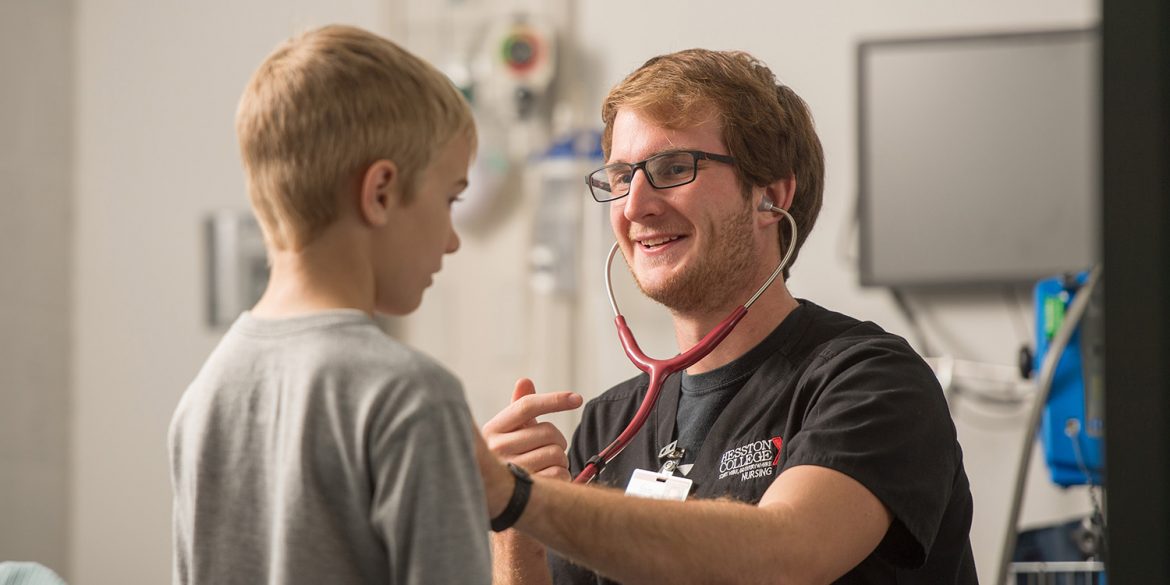Program Goals
BSN program goals were developed by faculty and are routinely reviewed. The primary reasons we exist as a nursing program on the Hesston College campus are to:
- Offer a Bachelor of Science in Nursing (BSN) program for pre-licensure students seeking to become registered nurses;
- Provide nursing education within a Christ-centered, supportive environment that facilitates the integration of thought, life and faith, and prepares graduates to serve others through the nursing profession;
- Prepare graduates with the essential nursing competencies and leadership skills that equip them to promote positive outcomes in healthcare and community settings and/or pursue post-baccalaureate education; and
- Benefit the healthcare community by developing nursing professionals who excel in the delivery of quality nursing care, leadership and service.
Program Outcomes
Program outcomes are performance indicators which reflect the extent to which the overall purpose of the Hesston College Nursing Program is being achieved, and by which program effectiveness is documented. These measureable, consumer-oriented indexes are collected, trended and communicated annually.
- Program Completion Rates: ≥ 70% of the students entering a given graduating class (generic, LPN and transfer) complete the program within 150% of the program length (adjusted to begin with the first required nursing course). This completion rate excludes students who withdrew for personal (non-academic) reasons.
- Employment Rates: ≥ 70% of graduates are employed in RN positions within one year of graduation.
- RN Licensure Rates:
- The NCLEX-RN pass rate is 80% or higher for first-time takers for the most recent calendar year.
- The overall NCLEX-RN pass rate for the program (first time and repeat testers) is 80% or higher.
- Achievement of Student Learning Outcomes (SLOs)
- On Nursing Student End of Program Survey, ≥ 4.0 on a 5.0 scale is achieved in each of the 11 SLOs when graduates are asked, “How well did the HC nursing program prepare you to do the following as you enter nursing practice?”
- Ninety percent (90%) of the graduating class will receive a grade of 78% or higher on the final copy of the BSN Outcomes Reflection Paper.
- All group scores in major content areas/NCLEX-RN content areas are at 65% or higher on an ATI RN Comprehensive Predictor assessment.
- The adjusted group score on an ATI RN Comprehensive Predictor assessment is at or above the Individual Program Mean.
- Program Satisfaction—Graduates:
- On the Final Evaluation of Nursing Program by Graduating Students Survey, a class mean score of 4.0 on a 5.0 scale has been achieved on the question related to overall satisfaction with the nursing program.
- Seventy-five percent (75%) or more would choose HC Nursing again and recommend the program to others.
- Twelve (12) months post-graduation: surveys indicate a group mean score of 3.0 on a 4.0 scale (3 = Satisfied) has been achieved on the question related to overall satisfaction with the nursing program.
Student Learning Outcomes
Upon completion of the nursing program, graduates will:
- Provide safe, holistic client-centered care, implementing evidence-based nursing interventions to meet diverse client, family and community needs.
- Demonstrate clinical judgment utilizing the six steps of the nursing process.
- Communicate therapeutically with the client and family, demonstrating effective interpersonal skills and caring behaviors.
- Communicate and collaborate effectively with the healthcare team to achieve optimal client outcomes.
- Generate teaching and learning processes targeted toward individual and community health promotion, disease prevention and risk reduction across the lifespan.
- Prioritize, delegate, manage and coordinate client care.
- Use information and technology to manage knowledge, mitigate error, improve quality and guide decision making.
- Demonstrate accountability while practicing within legal requirements and an ethical framework in nursing.
- Model professional behaviors, Christ-like values, a commitment to the nursing profession and continuous self-development.
- Demonstrate an understanding of organizational structure and the nurse’s impact on healthcare policy, finance and regulatory environments.
- Provide leadership to improve health outcomes in a changing practice environment through application of the liberal arts and sciences and the essential competencies of baccalaureate nursing education.


